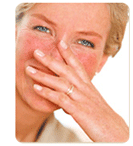Hot flashes are the most common and troublesome symptom of menopause. If you haven't been informed about hot flashes, a sudden severe episode can be frightening; so please take your time to read the special information on natural ways to avoid hot flashes below.
What are Hot Flashes?
Hot flashes are a sensation of intense heat in the upper part of the body, accompanied by sudden rapid heartbeat, a rising flushing of the chest, neck and face and is often followed by heavy sweating. The duration of hot flashes varies between thirty seconds and five minutes. Intensity and frequency of hot flashes varies greatly from woman to woman, but it is believed, that as faster a woman goes through the transition from regular menstrual periods to no periods, the more significant her hot flashes will be. Within three years before menopause, one out of two women has hot flash symptoms and about 75% of women have hot flashes during menopause.
|
|
|
|
Medical researchers were surprised at where women felt their hot flashes. Over half of the flashes started in the neck, head, scalp, and ears; 28% began in the neck or breasts; 24% below the breasts; 48% all over. Not all of these women experienced flashes consistently in the same areas. With regard to intensity, 48% hot flash symptoms were rated as mild, 39% as moderate, and 13% as severe. Mild meant that a flash was barely noticeable, was quick, and didn't interfere with anything. Moderate meant that it was warmer, noticeable (with obvious perspiration in certain areas), and longer lasting; often the women tried to end it by taking some clothes off. Severe meant that a flash was intensely hot and caused the woman to stop what she was doing immediately, remove as much clothing as she possibly could, and seek a way of cooling down.
|
|
|
|
|
|
What causes Hot Flashes?
| Hot flashes are felt by 3 out of every 4 women who go through menopause. No one knows exactly what causes hot flashes but the main purpose is probably an increased heat in the heat regulatory area of the brain. It can be triggered by spicy food, hot drinks, alcoholic drinks, stress, hot weather, tobacco, between others. The declining level of estrogen hormones, associated with menopause, are responsible for a malfunction of this heat regulatory area, which detects an increased body temperature and releases chemicals that cause the skin blood vessels to dilate so the heat can be released; in this way, starting the hot flashes! |
 |
Hot flash symptoms or other vasomotor symptoms such as dizziness and heart palpitations (the term vasomotor describes bodily changes related to the constriction and dilation of blood vessels) decrease in strength and frequency after menopause, but some women may exprience them for the rest of their life.
Natural ways to avoid Hot Flashes
The best way to avoid hot flashes is naturally. Hot flashes have a lot to do with the decreased levels of estrogen in a woman's body, but other factors can also cause the body temperature control to go out of whack. Avoiding things that trigger hot flashes can significantly lower the intensity as well as the quantity of hot flashes women experience during menopause.
|
|
|
|
- hot showers
- caffeine
- hot weather
- spicy food
|
- alcohol
- smoking
- anger
- stress
|
- hot drinks
- hot rooms
- diet pills
- hot food
|
|
|
|
|
Trying to avoid the triggers above, also wearing clothe made of natural materials (i.e. cotton) and practicing deep, slow abdominal breathing can produce a 50% decrease in hot flash frequency. Increasing level of activity (walk, swim, dance or bicycle) can also reduce hot flashes and have a positive impact on almost every other symptom attributed to menopause.
|
|
|
|
- diet that contains protein, fiber, fruits, vegetables and grains
- stop smoking; if you don't,
- drink 2 quarts of water each day
- avoid alcohol, caffeine, sugar, spicy foods and hot soups
- identify hot flash triggers
- get regular moderate exercise to reduce stress
|
- use a mini portable hand fan
- where possible, lower the thermostat
- keep cold water at hand
- dress in layers, to peal off in case of hot flash
- support your body with natural remedies
- avoid turtlenecks
- keep your sense of humor
|
|
|
|
|
Since hot flashes have been related to a declining level of estrogen, the pharmaceutical companies would make woman believe that for the treatment of hot flashes, drugs are the only solution. That isn't the case. Although Hormone Replacement Therapy (HRT) has been used to alleviate symptoms of menopause and avoid them with good success, more and more women consider less riskier approaches (natural ways to avoid hot flashes), since ovarian and breast cancer as well as heart disease, blood clots and strokes risks are associated with HRT.
Nowadays most women think that dealing with hot flashes is best accomplished via a combination of diet, healthy lifestyle and natural treatment. Also, we should always keep in mind that the most common cause of Hot Flashes is hormonal fluctuations.
Which are the best natural ways to avoid Hot Flashes?
Three levels of approaches can be considered for avoiding Hot Flashes:
(1)lifestyle changes, (2)alternative approaches and (3)drugs and surgery. The safest way is to start with the least risky approach and go on to the next level only if it is necessary. Click on treatments for hot flashes and don't miss these three excellent approaches. |
|

